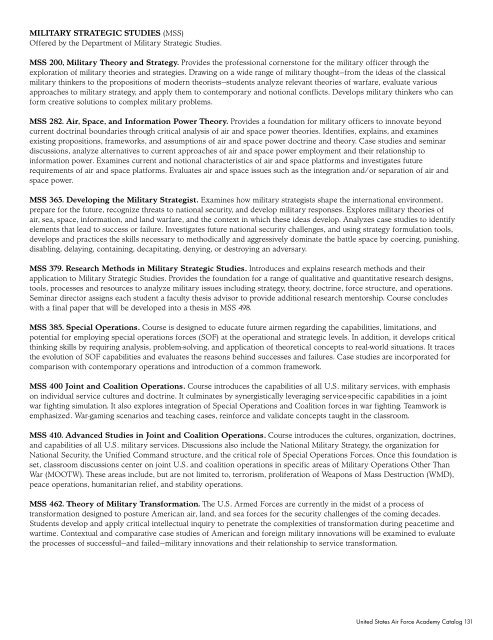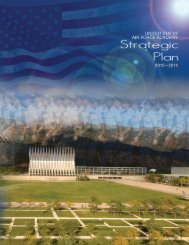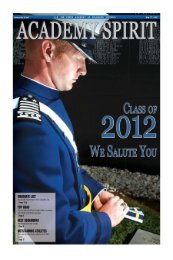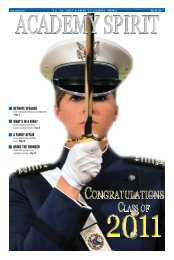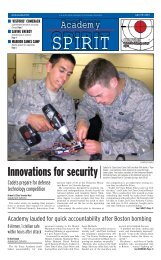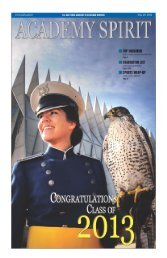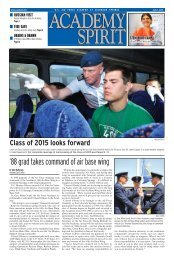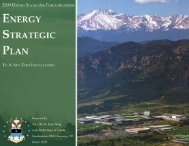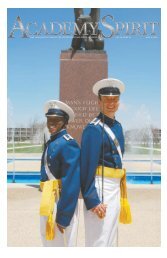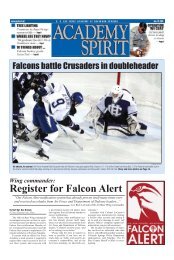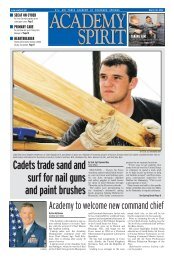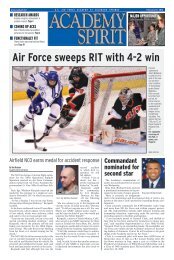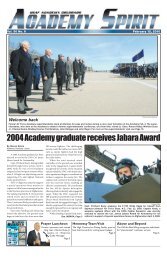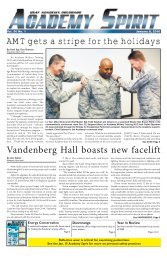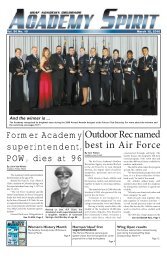2008-2009 Catalog - United States Air Force Academy
2008-2009 Catalog - United States Air Force Academy
2008-2009 Catalog - United States Air Force Academy
Create successful ePaper yourself
Turn your PDF publications into a flip-book with our unique Google optimized e-Paper software.
MILITARY STRATEGIC STUDIES (MSS)<br />
Offered by the Department of Military Strategic Studies.<br />
MSS 200, Military Theory and Strategy. Provides the professional cornerstone for the military officer through the<br />
exploration of military theories and strategies. Drawing on a wide range of military thought—from the ideas of the classical<br />
military thinkers to the propositions of modern theorists—students analyze relevant theories of warfare, evaluate various<br />
approaches to military strategy, and apply them to contemporary and notional conflicts. Develops military thinkers who can<br />
form creative solutions to complex military problems.<br />
MSS 282. <strong>Air</strong>, Space, and Information Power Theory. Provides a foundation for military officers to innovate beyond<br />
current doctrinal boundaries through critical analysis of air and space power theories. Identifies, explains, and examines<br />
existing propositions, frameworks, and assumptions of air and space power doctrine and theory. Case studies and seminar<br />
discussions, analyze alternatives to current approaches of air and space power employment and their relationship to<br />
information power. Examines current and notional characteristics of air and space platforms and investigates future<br />
requirements of air and space platforms. Evaluates air and space issues such as the integration and/or separation of air and<br />
space power.<br />
MSS 365. Developing the Military Strategist. Examines how military strategists shape the international environment,<br />
prepare for the future, recognize threats to national security, and develop military responses. Explores military theories of<br />
air, sea, space, information, and land warfare, and the context in which these ideas develop. Analyzes case studies to identify<br />
elements that lead to success or failure. Investigates future national security challenges, and using strategy formulation tools,<br />
develops and practices the skills necessary to methodically and aggressively dominate the battle space by coercing, punishing,<br />
disabling, delaying, containing, decapitating, denying, or destroying an adversary.<br />
MSS 379. Research Methods in Military Strategic Studies. Introduces and explains research methods and their<br />
application to Military Strategic Studies. Provides the foundation for a range of qualitative and quantitative research designs,<br />
tools, processes and resources to analyze military issues including strategy, theory, doctrine, force structure, and operations.<br />
Seminar director assigns each student a faculty thesis advisor to provide additional research mentorship. Course concludes<br />
with a final paper that will be developed into a thesis in MSS 498.<br />
MSS 385. Special Operations. Course is designed to educate future airmen regarding the capabilities, limitations, and<br />
potential for employing special operations forces (SOF) at the operational and strategic levels. In addition, it develops critical<br />
thinking skills by requiring analysis, problem-solving, and application of theoretical concepts to real-world situations. It traces<br />
the evolution of SOF capabilities and evaluates the reasons behind successes and failures. Case studies are incorporated for<br />
comparison with contemporary operations and introduction of a common framework.<br />
MSS 400 Joint and Coalition Operations. Course introduces the capabilities of all U.S. military services, with emphasis<br />
on individual service cultures and doctrine. It culminates by synergistically leveraging service-specific capabilities in a joint<br />
war fighting simulation. It also explores integration of Special Operations and Coalition forces in war fighting. Teamwork is<br />
emphasized. War-gaming scenarios and teaching cases, reinforce and validate concepts taught in the classroom.<br />
MSS 410. Advanced Studies in Joint and Coalition Operations. Course introduces the cultures, organization, doctrines,<br />
and capabilities of all U.S. military services. Discussions also include the National Military Strategy, the organization for<br />
National Security, the Unified Command structure, and the critical role of Special Operations <strong>Force</strong>s. Once this foundation is<br />
set, classroom discussions center on joint U.S. and coalition operations in specific areas of Military Operations Other Than<br />
War (MOOTW). These areas include, but are not limited to, terrorism, proliferation of Weapons of Mass Destruction (WMD),<br />
peace operations, humanitarian relief, and stability operations.<br />
MSS 462. Theory of Military Transformation. The U.S. Armed <strong>Force</strong>s are currently in the midst of a process of<br />
transformation designed to posture American air, land, and sea forces for the security challenges of the coming decades.<br />
Students develop and apply critical intellectual inquiry to penetrate the complexities of transformation during peacetime and<br />
wartime. Contextual and comparative case studies of American and foreign military innovations will be examined to evaluate<br />
the processes of successful—and failed—military innovations and their relationship to service transformation.<br />
<strong>United</strong> <strong>States</strong> <strong>Air</strong> <strong>Force</strong> <strong>Academy</strong> <strong>Catalog</strong> 131


